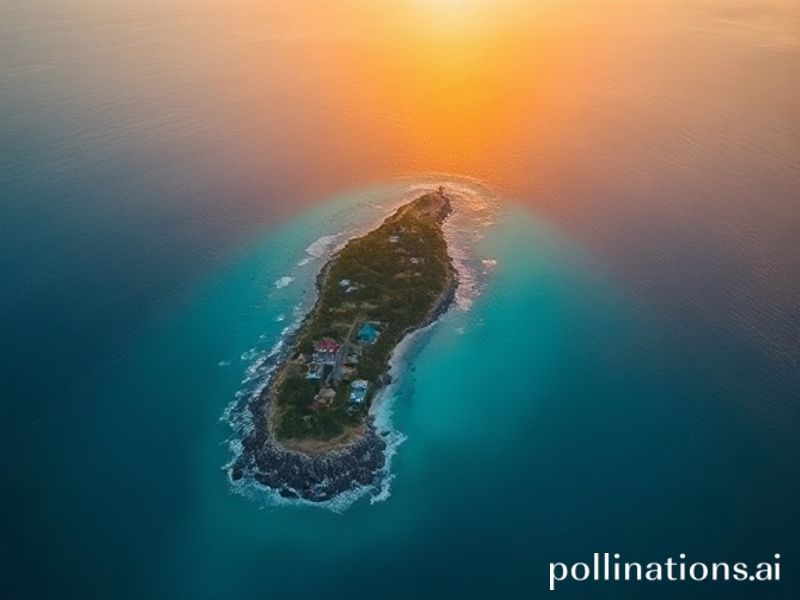Tuvalu Is Drowning: How a Dot in the Pacific Became the World’s First Digital Ghost State
Tuvalu is the geopolitical equivalent of a canary in a coal mine, except the canary is nine coral atolls, the coal mine is the Pacific Ocean, and the miners are too busy arguing over the thermostat to notice the bird has already started packing its bags. On most world maps the country is cropped out entirely—an accidental metaphor for how the international community treats nations that can’t return the favor with naval fleets or oil reserves. Yet this postage-stamp archipelago, population 11,000 (give or take a cousin who left for Auckland), is quietly rewriting the rules of statehood, digital sovereignty, and what it means to exist when your literal ground is dissolving beneath you.
Start with the numbers, because they’re darkly hilarious. Highest elevation: 4.6 meters, roughly the height of a giraffe on tiptoe. Land area: 26 km², or one-third of Disney World, minus the enchantment. The sea is rising 1.5 times the global average, which means every high tide now arrives with the enthusiasm of a Times Square Elmo demanding a tip. By 2100 the U.N. projects Tuvalu could be the world’s first sovereign ghost: a nation with a seat at the General Assembly, a flag, an anthem—and absolutely nowhere to stand. Other countries fret over border walls; Tuvalu’s border is simply dissolving, like a sugar cube in a very expensive cup of Nescafé.
Faced with aquatic oblivion, Tuvalu has done what any sensible microstate would: it pivoted to the cloud—literally. In 2022 the finance minister stood knee-deep in seawater and uploaded the entire country to the metaverse, blockchain-etched for posterity. Picture Atlantis redesigned by Minecraft interns: digital reefs, NFT passports, and a 3-D parliament where your avatar can drown in bureaucratic procedure without the inconvenience of actual lungs. Critics called it a gimmick; Tuvalu called it “sovereignty backup,” a phrase that sounds like an IT joke until you realize it’s the only archive that can’t be water-damaged. Other low-lying nations—Maldives, Kiribati, soon Bangladesh’s tourist board—are watching like homeowners photocopying deeds while the wildfire approaches.
The scheme also exposes the polite fiction we call international law. Current doctrine says a state needs (a) a permanent population, (b) a defined territory, (c) a government, and (d) the capacity to enter relations. Tuvalu is on track to fail the first two while still fulfilling the last, becoming the diplomatic equivalent of a QR code taped to a buoy. Already, Australia has agreed to a bilateral visa scheme that amounts to “we’ll take your people if you keep your fishing rights,” a bargain that swaps real estate for tuna and hopes nobody notices the imperial aftertaste. Meanwhile, the U.S. State Department’s climate reports refer to such places as “potentially displaced states,” a term so clinically euphemistic it could be a medical diagnosis for homelessness.
Of course, the irony is oceanic. Tuvalu’s carbon footprint is roughly that of a Midwestern high-school football program, yet it will be erased by emissions from countries that can’t find it on a Risk board. The annual per-capita CO₂ there clocks in at 0.2 metric tons; the global average is sixteen times higher, and if you’re reading this over brunch in Frankfurt or Fresno, congratulations—you are personally out-emitting an entire Tuvaluan village simply by overcooking your croissant. The moral math is so absurd that Tuvalu’s prime minister has taken to quoting Kafka at climate summits, presumably because Beckett was booked.
Still, the place refuses to sink quietly. Its diplomats have mastered the art of turning vulnerability into leverage: threatening to revoke .tv domain rights (yes, that .tv) unless streaming giants cough up adaptation funds. Netflix, ever allergic to bad PR, now underwrites seawalls—call it “Stranger Tides.” And when China’s delegations arrive bearing cardboard checks for new ports, Tuvalu plays Taipei and Beijing off each other like a bouncer working the velvet rope at a club located, appropriately, on reclaimed land.
What happens next is a preview trailer for the rest of us. If Tuvalu can negotiate continued statehood without soil, expect Silicon Valley libertarians to anchor rusting cruise ships and declare the Republic of Sealand 2.0, now with venture capital. If it fails, we’ll witness the first nation to achieve extinction without a single shot fired—an immaculate dissolution, sponsored by your SUV and mine.
Either way, the lesson is uncomfortably buoyant: in the 21st century, sovereignty is no longer about the dirt you can defend but the narrative you can sustain. Tuvalu’s greatest export was once copra; now it’s existential satire—an entire country turned allegory, floating toward the future on a raft of dark humor and legal innovation. The rest of the world would do well to listen, preferably before the tide reaches our own ankles.







